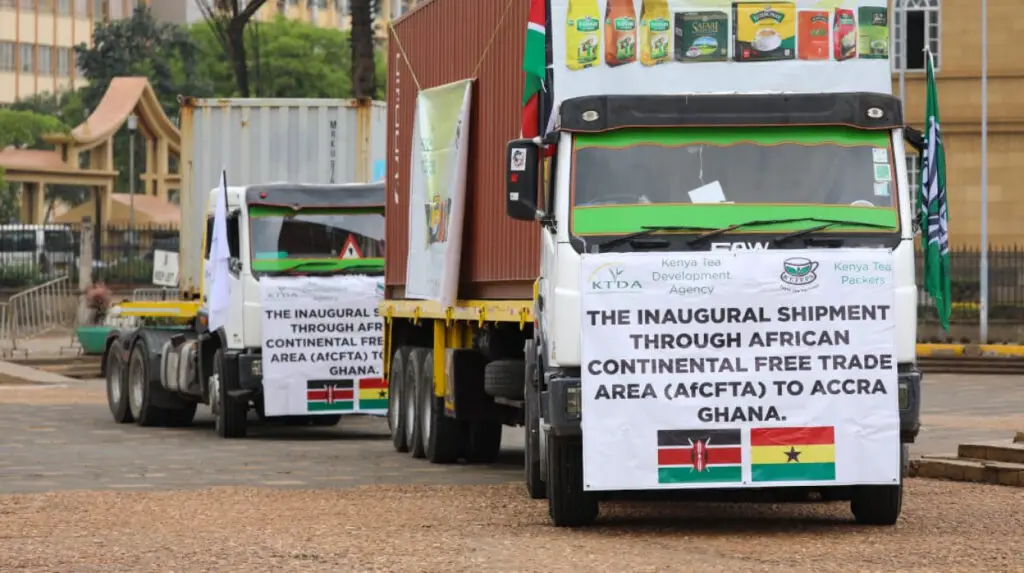- Rwanda and Kenya who have already started trading through the agreement.
- Mid-February, Tanzania also said it was ready to trade under the agreement.
- The implementation of AfCFTA is projected to increase intra-African trade significantly, especially in manufacturing.
Uganda has expressed readiness to join Kenya, Tanzania and Rwanda in trading under the African Continental Free Trade Area (AfCFTA) as the continent slowly embraces the pact.
The implementation of AfCFTA is projected to increase intra-African trade significantly, especially in manufacturing.
The share of intra-Africa exports to total global exports is expected to increase in Tanzania by 28 per cent, Uganda by 29 per cent, Rwanda by 33 per cent and Kenya by 43 per cent.
“As Ugandan private sector, we are ready to trade under the AfCFTA Guided Trade Initiative and follow our counterparts from Rwanda and Kenya who have already started trading through the agreement,” East African Business Council (EABC) Vice Chairman Simon Kaheru said.
Kaheru was speaking during the Private Sector Sensitization Workshop on African Continental Free Trade Area (AfCFTA) Agreement on Trade in Goods Protocol organized by East African Business Council (EABC), Private Sector Foundation Uganda (PSFU), Uganda Manufacturers Association with the support of GIZ- Support to East African Integration.
EABC Chief Executive John Bosco Kalisa noted that Uganda exports to Africa hit $1.77billion in 2021, increasing by 26 per cent from $1.4billion in 2020, while imports stood at $2.47billion in 2021.
Uganda has great potential to export coffee, milk, and sugar, beverages, iron and steel, cooking oils and cement.
Currently, Uganda’s exports of sugar to the continent is valued at $99.8 million and there is an untapped export potential of an additional $53 million of sugar exports to the continent, Kalisa notes.
GIZ- Support to East African Integration and the EABC are working closely to improve knowledge of the private sector on the AfCFTA protocol.
During the forum, Economic Policy Advisor on AfCFTA to the EAC, Lamech Wesonga, urged the private sector to take a proactive role by trading under the continental deal.
He retaliated GIZ’s commitment to partner with the EAC governments and the private sector to unlock opportunities in the 1.3 billion population market.
The private sector workshop on AfCFTA convened 50 businesses in Uganda who learned about the AfCFTA Trade in Goods Protocol and its annexes (especially Rules of Origin, Tariff Concession and Non-Tariff Barriers) and implications to businesses in the EAC bloc.
The AfCFTA Agreement is a clear testimony that the African States have committed to doing more trade and investment among themselves.
The signature of the Agreement Establishing the AfCFTA on March 21, 2018 marked a historic milestone for economic integration in Africa with intention of creating a market of 1.3 billion people with a combined gross domestic product (GDP) valued at $3.4 trillion.
The Agreement envisages boosting intra-African trade through the gradual elimination of tariffs on over 90 African goods, and the removal of non-tariff barriers and trade restrictions on goods and services, respectively.
The EAC exports of goods to Africa stood at $14.7 billion comprising 36 per cent share of EAC total exports to the world ($40.3 billion).
Top EAC exports to Africa included precious stones, coffee, tea, cement, animal fats, mineral oils, copper, cobalt oxides and iron and steel. (ITC Data including DRC).
East Africa as a bloc has great potential to export copper, cobalt oxides, cereals, vegetables, tea, coffee, sugar, textile products, soap, sesame seeds, edible oils, tubers and milk to the continent.
Trade experts from the East African Community (EAC) say reduction in trade costs relating to trade facilitation, Non-Tariff Measures (NTMs) and Non-Tariff Barrie’s (NTBs) will help grow trade.
Membership and ratification
To date, 54 African Union (AU) member states have signed the AfCFTA agreement with 49 having ratified it, making them eligible to trade.
Ghana, Cameroon, Egypt, Rwanda, Tanzania and Kenya are the six countries piloting the agreement, even as countries work on pending issues on preferential Rules of Origin on sensitive goods, which account for seven per cent of the tariff lines.
The stalemate has been on textile and apparel, sugar and sugar products, goods produced in Special Economic Zones (SEZs), edible oils and motor vehicles.
Despite the significance of trade, Africa’s share of the total global trade remains low at 2.8 per cent.
In addition, the share of intra-African trade has been limited at 18 per cent, which the trade deal is expected to increase. Kenya Private Sector Alliance (Kepsa) has raised issues around Non-Tarriff-Barriers which it says continue to affect cross-border trade.
“Building Africa into a continental village needs the understanding of the characteristics of a village and that this should start from a political level,” Kepsa deputy CEO Victor Ogola said, “Non-tariff barriers are derailing the realization of the AfCFTA pact.”
Kenya is already trading under the pact, having exported batteries and tea to Ghana last year, under the AfCFTA Guided Trade Initiative. Plans are underway to export electric cables and automobile parts.
In February, Tanzania also said it was ready to trade under the agreement.
The Deputy Permanent Secretary of the Ministry of Investment, Industry and Trade, Ally Gugu, said the ministry had rolled out awareness campaigns for businesses interested to import intermediary inputs, or exporting products to the continent through the AfCFTA Guide Trade Initiative.
Tanzania’s exports to Africa hit $2.5 billion in 2021 increasing by 13 per cent from 2020, while imports stood at $1.2 billion. It has great potential to export rice, packaging material, and kraft paper to the continent.
In particular, Tanzania has an untapped potential of $136 million from the export of rice alone to the continent.
“The ministry has developed the National Implementation strategy for AfCFTA which will be validated by the private sector,” Gugu said during a forum in Dar es Salaam.
EABC board director Mucai Kunyiha has urged the Kenyan private sector to take a proactive role by trading under the AfCFTA.

